2017-2018学年人教版初中英语七年级上册期中期末全套课时复习课件:Unit 7 Section A (1a-2e)
合集下载
七年级英语上册人教版期中综合复习精美课件
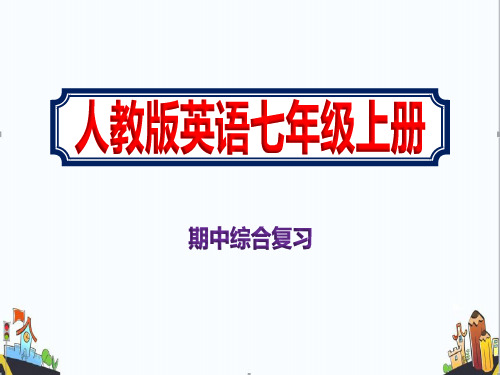
in China 在中国
知识点
⑴ Mr ,Mrs ,Miss 和Ms后接姓氏
eg. Mz Brown
Mr [‘mistə(r)] 先生
Miss [mis] 小姐,女士;(年轻未
婚女子)
Mrs [’misiz] 太太;夫人(用于已婚妇女姓名前) Ms. [miz] 女士
⑵ 英美人的姓名与中国人的姓名顺序相反,名在前,姓在后。如Jim Green, 名是Jim,姓
play computer games玩电脑游戏
lost and found 失物招领
a se
an eraser 一块铅笔擦
thanks… for…为…感谢
a photo of your family 你家人的照片=your family photo 你的全家福
am 上午
pm下午
PRC 中华人民共和国
cm厘米 RMB 人民币
PE体育课
Who’s = Who is He’s = He is What’s = What is That’s = That is it’s = it is
Who’re = Who are They’re =They are Where’s = Where is isn’t = isn’t not
tape player 录音机
model plane 飞机模型
some watches 一些手表
two dictionaries 两本字典
What / how about …? ……怎么样? ……又如何呢?
Excuse me.请原谅/打扰了
thanks = thank you 谢谢
Bye / Bye-bye / Good-bye 再见
2017年人教版初中英语七年级英语上册期中期末总复习课件(单元知识点归类总结)
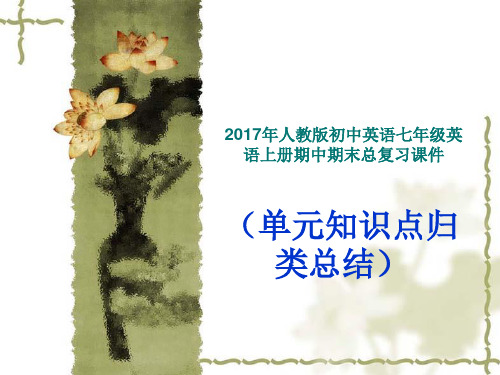
Liu(Lau)
last name
Dehua
first name
= family name(姓)
=given name(名)
3. first
name 名字 last name 姓氏 first name与given name同义, last name与 family name同义。 Her name is Mary Smith; Her family name is Smith. 她的姓名是玛丽· 史密斯, 史密斯是她的姓。
Telephone numbers
What’s your phone number?
It’s …/My phone number is … What’s his/her phone number?
It’s …/His/Her phone number is … phone number = telephone number
sister 姐,妹 brother 兄,弟 mother妈妈。母亲 father爸爸,父亲 parent父亲或母亲 grandmother祖母,外祖母 grandfather祖父,外祖父 grandparent祖父(母) family 家庭;家族; who 谁 those 那些 they 他们;它们;她们 these这些 well 好吧 have 经受;经历 day 一天,一日
Do you know them? 你认识他们吗?
Mr. White
怀特先生
Mrs. Green
Miss Black Ms. Brown
格林夫人
布莱克小姐 布朗女士
Notes:
Mr./Mrs./Miss/Ms. + last name
For example: Her name is Cindy White. We call her Miss White. The old man is John Smith. We can call him Mr. Smith.
2017-2018学年人教版初中英语七年级上册期中期末全套课时复习课件:Unit 6 Section B (1a-1e)
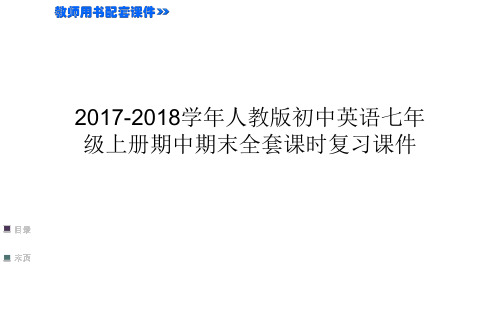
答案: 1. ice-cream
2. birthday
3. fruit
4. lunch
5. milk
Ⅱ. 情景对话 lunch, bread, about, them, for A: Hello, Li Ming. Do you lilike eggs and
通常加不定冠词a/an。
【归纳拓展】各种各样的“餐”
【学以致用】 I have lunch at school every day.
A. the
B. a
C. an
D. /
Ⅰ. 选择正确的单词填空 1. Lily 2. 3. His father 4. I often have eggs for 5. She doesn’t like (like/likes) chicken very much. (Do/ Does) the boy like carrots or bananas? (watches/watch) TV every day. (breakfast/the breakfast) . (tomato/tomatoes) .
B. eggs; chicken
D. apples; banana
B. Does; like
C. Do; likes
D. Does; likes
3. My cousin
A. like; like C. likes; likes 4. —Let’s play
oranges and I
pears.
B. like; likes D. likes; like . .
5 because they aren’t healthy. 4. 3. about 4. For 5. 5. them
2017-2018学年人教版初中英语七年级上册期中期末全套课时复习课件:Unit 5 Section A (Grammar Focus-3c)
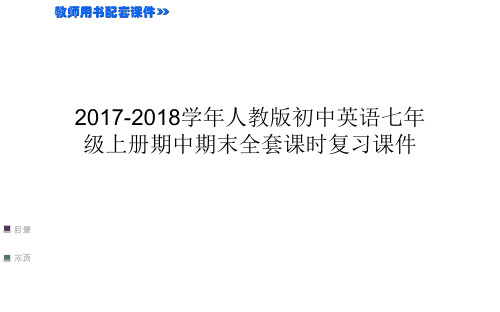
—That
2. My grandfather 3. Tom and Jim 4. —Let’s —That’s OK.
great.
a radio. He listens to it every day. a nice and big room. soccer.
5. —Do you have a ping-pong ball?
弄、摆弄某物”。
【学以致用】 ①Peter can play soccer ball, but he can’t play C. /; the chess C. /; with D. /; a his son. D. /; and
violin.
A. the; the A. the; and B. the; / B. the; with ②The father often plays
2017-2018学年人教版初中英语七年 级上册期中期末全套课时复习课件
Unit 5
Do you have a soccer ball?
Section A (Grammar Focus—3c)
1. play v. 参加(比赛或运动); 玩耍
【语境领悟】 *Let’s play! 让我们玩吧! *Let’s play basketball. 让我们打篮球吧。 *My sister plays the piano every day.
6. Does he have a notebook?
【知识构建】 一般现在时态中have的用法
have意为“有; 拥有; 占有”, 表示所属关系, 有人称和数
的变化, 其主语一般是人, 有时也可以是物。它的一般现在时 的各种句式如下:
1. 肯定句: 主语+ have/has. . . have 用于复数名词、第一、二人称单复数或第三人称复数代
2017-2018学年人教版初中英语七年级上册期中期末全套课时复习课件:Unit 9 Section B (1a-1d)
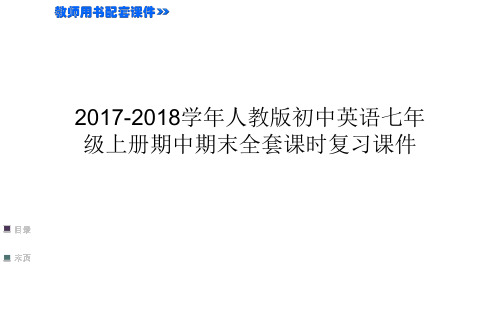
—Why
— it’s
he
.
math?
2. ——数学课在什么时候? ——它 (数学) 在星期三。 — is the math class?
—It’s
Wednesday.
2. When; on
答案: 1. does; like; Because; interesting
1. Our teacher is very busy every day.
二、时刻表示法 1. 表示几点钟用基数词加可以省略的 o’clock, o’clock或five。 2. 表示几点过几分 , 在分钟后加 past, 再加小时。 five past seven七点过五分, half past six六点半, a quarter past eight八 点过一刻, seven past eight八点过七分。 5: 00 读作 five
2. Wednesday
3. Thursday
5. 右边 3. 谈谈„„ 答案: 1~3. CAB
A. on the right
B. talk about C. soccer game
Ⅲ. 句型填词 1. ——他为什么喜欢数学? ——因为它 (数学) 有趣。
2. I think math is very difficult.
3. Is the movie boring? ____________________________________________________ 答案: 1. free 2. easy 3. interesting
4. We have a P. E. class at 8: 00 o’clock a. m. .
6: 31读作six thirty-one
2017-2018学年人教版初中英语七年级上册期中期末全套课时复习课件:Unit 5 Section B (2a-2c)
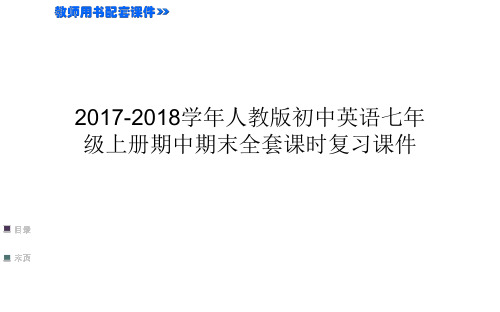
6. difficult (adj. )
7. they (pron. ) 答案: 1. 相同的 5. 同班同学 6. easy
→
→ 2. 体育运动 7. them 3. 只; 仅
(反义词)
(宾格) 4. 在„„以后
Ⅱ. 短语翻译
1. 在电视上
2. 下课后 3. 在同一所学校 答案: 1. on TV 2. after class 3. in the same school
Ⅲ. 句型填词
1. 在学校里我们和我们的朋友们一起踢足球。 We play soccer 看它们! our friends. 2. 我喜爱体育, 但是我并不进行体育活动——我只是在电视上
I love sports,
I don’t play them—I
!
watch
3. 我喜欢乒乓球。对我来说它很容易。 I like ping-pong. It’s easy 答案: 1. at school with 2. but; only; them on TV . 3. for me
1. After class, I play ping-pong with my
classmates. ______________________________________ 2. I only watch them on TV. ______________________________________
2017-2018学年人教版初中英语七年 级上册期中期末全套课时复习课件
Unit 5
Do you have a soccer ball? Section B (2a—2c)
Ⅰ. 单词拼写
1. same (adj. )
2017-2018学年人教版初中英语七年级上册期中期末全套课时复习课件:Unit 5 单元复习课
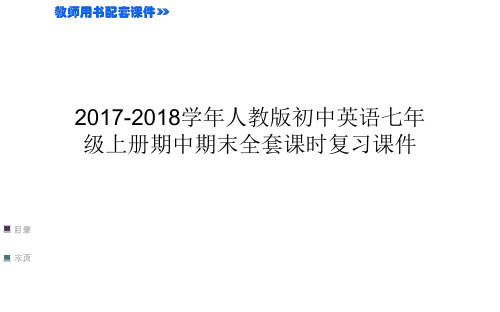
ts things.
答案: has
4. My parents have three basketballs. (改为否定句)
My parents three basketballs.
5. They have a volleyball. (改为一般疑问句) they 答案: 4. don’t have a volleyball? 5. Do; have
he
答案: 4. them 5. plays
TV every evening?
6. go to the same 7. Does; watch
Ⅵ. 词汇串记
Do You Have a Soccer Ball? Frank Brown 1 (没有) have a soccer ball, 3 2 (但是)
4. He likes apples and he eats
5. My father afternoon.
(they) every day.
(play) basketball with his friends every
6. 他们在同一所学校上学并且都喜欢打乒乓球。 They and both like to play ping-pong. 7. He watches TV every evening. (改为一般疑问句) school
2017-2018学年人教版初中英语七年 级上册期中期末全套课时复习课件
单元复习课 Unit 5
Ⅰ. 词汇速记 1. 网球 (n. ) 2. (英式) 足球 (n. ) 3. 排球 (n. )
4. 篮球 (n. )
5. 迟到 (adj. )
6. 去取; 得到 (v. )
答案: 1. tennis 6. get 2. soccer 3. volleyball 4. basketball 5. late
答案: has
4. My parents have three basketballs. (改为否定句)
My parents three basketballs.
5. They have a volleyball. (改为一般疑问句) they 答案: 4. don’t have a volleyball? 5. Do; have
he
答案: 4. them 5. plays
TV every evening?
6. go to the same 7. Does; watch
Ⅵ. 词汇串记
Do You Have a Soccer Ball? Frank Brown 1 (没有) have a soccer ball, 3 2 (但是)
4. He likes apples and he eats
5. My father afternoon.
(they) every day.
(play) basketball with his friends every
6. 他们在同一所学校上学并且都喜欢打乒乓球。 They and both like to play ping-pong. 7. He watches TV every evening. (改为一般疑问句) school
2017-2018学年人教版初中英语七年 级上册期中期末全套课时复习课件
单元复习课 Unit 5
Ⅰ. 词汇速记 1. 网球 (n. ) 2. (英式) 足球 (n. ) 3. 排球 (n. )
4. 篮球 (n. )
5. 迟到 (adj. )
6. 去取; 得到 (v. )
答案: 1. tennis 6. get 2. soccer 3. volleyball 4. basketball 5. late
人教版英语七年级上册全册复习课件
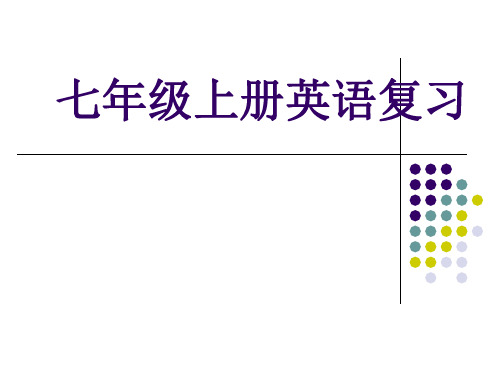
英国人的名字: family name, first name, last name
Jim
Allen
Green
语法: 1. 物主代词的用法 2. 人称代词的用法 3. 基数词:1至9的读法和写法
物主代词
单数
第一人称 第二人称 第三人称 第一人称
复数
第二人称 第三人称
形容 词性 物主 代词
名词 性物 主代 词
词汇
where bookcase under bag video thing need television table sofa they match tape can floor bed chair on alarm hat bring room dresser drawer know clock take some desk
Unit
词汇
my name is clock I am nice to meet you what your hello his and her question answer look first first name last last name boy girl zero one two three four five six seven eight nine telephone number phone telephone/phone number it card family family name ID card
词汇
how much pants (pl) sock shirt shorts(pl) sweater shoe skirt sale dollar black white red green blue yellow big small short long clerk help want welcome example clothes(pl) store come buy very price each anybody afford our see yourself sell from sorry have a look on sale(廉价出售) ten eleven twelve thirteen fifteen sixteen seventeen eighteen nineteen twenty thirty Here you are.
2017-2018学年人教版初中英语七年级上册期中期末全套课时复习课件:Unit 9 单元复习课
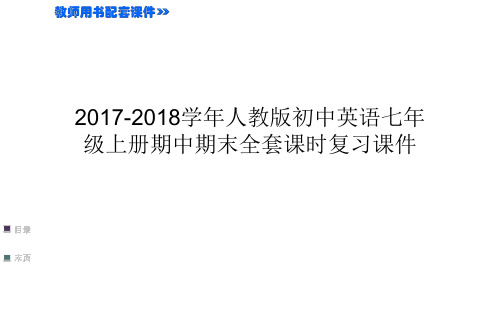
A. where
B. how
C. when
D. why
5. (2013· 白银中考) —Be sure to calm down and read every
sentence carefully! — . B. Never mind D. Not at all A. OK, I’ll do it C. It’s OK
English. He likes English he has 5
lunch at 12: 00. In the afternoon he has
home at 4: 00. He usually watches TV after dinner.
I think John isn’t
8
(有空的) all day.
have to wait for hours before the plane takes off. A. because B. though C. until
you usually
D. unless
3.
—
(2013· 潍 坊 中 考 ) —Would you help me clean up the
11. finish
12. lesson
13. China (n. ) 14. free (adj. ) 15. use (v. ) 16. hour (n. )
→ → → →
(adj. ) 中国的 (反义词) 忙的 (adj. ) 有用的 (同音词) 我们的
答案:13. Chinese
14. busy
Ⅵ. 词汇串记
John is always 2 1 (忙的) on Monday. At 8 o’clock he has 3 (语文) . At 9: 00 he has (因为) it’s interesting. At 11: 00 6 (最喜爱的) subject. He has 7 (运动) . He goes (数学) . He doesn’t like 4 (音乐) . That’s his
人教版七年级英语上期末总复习课件详细

• Week 3: Exam-focused review - providing exam-focused review materials and strategies, including past exam papers and detailed analysis of exam formats and question types.
To focus on specific topics or skills that students have struggled with or need extra practice in.
Exam-focused review
To provide exam-focused review materials and strategies, including past exam papers and detailed analysis of exam formats and question types.
02
Vocabulary and Grammar Review
vocabulary review
词汇复习
复习七年级英语课程中学习的所有词汇,包括名词、动词、形容词、副词等各类 词性,以及常用短语和习惯用语。通过例句和练习题加深记忆和理解。
Grammar Review
语法复习
系统回顾七年级英语课程中的语法知识,包括时态、语态、虚拟语气、非谓语动词等。通过例句解析和练习题巩固语法规则 ,提高语言运用能力。
Reading skill
Reading strategy
Teach students how to use reading strategies, such as skimming, scanning, and predicting, to improve their reading efficiency and comprehension.
To focus on specific topics or skills that students have struggled with or need extra practice in.
Exam-focused review
To provide exam-focused review materials and strategies, including past exam papers and detailed analysis of exam formats and question types.
02
Vocabulary and Grammar Review
vocabulary review
词汇复习
复习七年级英语课程中学习的所有词汇,包括名词、动词、形容词、副词等各类 词性,以及常用短语和习惯用语。通过例句和练习题加深记忆和理解。
Grammar Review
语法复习
系统回顾七年级英语课程中的语法知识,包括时态、语态、虚拟语气、非谓语动词等。通过例句解析和练习题巩固语法规则 ,提高语言运用能力。
Reading skill
Reading strategy
Teach students how to use reading strategies, such as skimming, scanning, and predicting, to improve their reading efficiency and comprehension.
2017-2018学年人教版初中英语七年级上册期中期末全套课时复习课件:Unit 8 Section A (1a-2e)
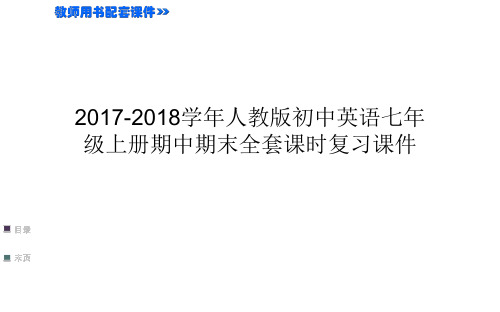
____________________________________________________ 答案: in+年/季节/月份/上午/下午/晚上; at +时刻; on +具体某 一天/具体某一天的上午/下午/晚上。
1. on October 2nd
在十月二日 【语境领悟】 *He was born on January 3rd, 2000. 他生于2000年1月3日。
八岁时, 他和他的父母去了美国。
(2) “of +基数词”。此结构常作后置定语 , years old。 At that time, he was just a boy of sixteen. 那时, 他只是一个十六岁的男孩。 基数词后不能接
(3) “基数词-year-old”。此结构常用作前置定语。 When he was an eight-year-old boy, he began to make a living. 当他是一个八岁的男孩时, 他就开始谋生了。
2017-2018学年人教版初中英语七年 级上册期中期末全套课时复习课件
Unit 8
When is your birthday? Section A (1a—2e)
Ⅰ. 单词拼写 1. when (adv. ) 2. month (n. ) 3. January (n. ) 4. December (n. )
3. —How old are you? ——你多大了? —I’m thirteen.
——我十三岁了。
【句型剖析】 (1) how old意为“多大年纪; 几岁”, 用来询问年龄。old是形 容词 , 意为“„„岁的”。其句型结构为“ How old+be+ 主 语? ”表示“„„几岁/多大了? ”其同义句: What’s one’s age?
1. on October 2nd
在十月二日 【语境领悟】 *He was born on January 3rd, 2000. 他生于2000年1月3日。
八岁时, 他和他的父母去了美国。
(2) “of +基数词”。此结构常作后置定语 , years old。 At that time, he was just a boy of sixteen. 那时, 他只是一个十六岁的男孩。 基数词后不能接
(3) “基数词-year-old”。此结构常用作前置定语。 When he was an eight-year-old boy, he began to make a living. 当他是一个八岁的男孩时, 他就开始谋生了。
2017-2018学年人教版初中英语七年 级上册期中期末全套课时复习课件
Unit 8
When is your birthday? Section A (1a—2e)
Ⅰ. 单词拼写 1. when (adv. ) 2. month (n. ) 3. January (n. ) 4. December (n. )
3. —How old are you? ——你多大了? —I’m thirteen.
——我十三岁了。
【句型剖析】 (1) how old意为“多大年纪; 几岁”, 用来询问年龄。old是形 容词 , 意为“„„岁的”。其句型结构为“ How old+be+ 主 语? ”表示“„„几岁/多大了? ”其同义句: What’s one’s age?
- 1、下载文档前请自行甄别文档内容的完整性,平台不提供额外的编辑、内容补充、找答案等附加服务。
- 2、"仅部分预览"的文档,不可在线预览部分如存在完整性等问题,可反馈申请退款(可完整预览的文档不适用该条件!)。
- 3、如文档侵犯您的权益,请联系客服反馈,我们会尽快为您处理(人工客服工作时间:9:00-18:30)。
请把我的书包带到教室去好吗? (2) take表示“花费”之意。 It takes me an hour to do homework every day. 我每天花费一小时做作业。
【学以致用】 —The bananas are two dollars.
如果你不想做就不必做。
【自主归纳】 (1) need为实义动词, 意为“需要”, 有人称和数的变化, 后面
可接名词、代词、动名词及动词不定式; 可用于肯定句、疑问
句和否定句中。 Tom needs to buy a new pen today. 汤姆今天需要去买一支新钢笔。
(2) need可作情态动词, 意为“需要”, 无人称和数的变化, 后 接动词原形, 变为否定句时要在need后加上not; 变为疑问句时,
2. Can I help you? 我能帮您吗? 【句型剖析】 (1) Can I help you? 是服务人员或营业员主动询问顾客需要的 常用语, 类似的说法还有“May I help you? ”和“What can I
do for you? ”
(2) 如果顾客需要购物时, 可回答: Yes, please. 否定回答可用: No, thanks.
2017-2018学年人教版初中英语七年 级上册期中期末全套课时复习课件
Unit 7
How much are these socks? Section A (1a—2e)
Ⅰ. 单词拼写
1. sock (n. )
2. T-shirt (n. ) 3. sweater (n. ) 4. trousers (n. ) 5. shoe (n. )
*How much milk is there in the glass? 玻璃杯里有多少牛奶?
【学以致用】 (2013· 济南中考) —Jenny, I need some milk.
—OK, Mum.
A. How much C. How often
do you need?
B. How many D. How long
1. 什么颜色
2. 多少 (钱) 3. 看起来很漂亮 答案: 1~3. CAB
A. how much
B. look nice C. what color
Ⅲ. 句型填词 1. ——这袜子多少钱? ——两美元。 — are these socks?
—They’re two dollars.
答案: How much
*OK. I’ll take it.
好吧, 我买了。 *My father often takes me to the zoo. 我爸爸经常带我去动物园。
【自主归纳】 (1) take为动词, 意为“买下; 拿; 取”, 相当于get/buy/have。
I’ll take the T-shirt for my daughter.
我要为我女儿买这件T恤衫。 (2) 顾客购物时, 常用I’ll take it/ them. 表示“我要买下了”。
【归纳拓展】
take的多种词义
(1) take+人/物+to+地点, 意为“把某人/某物带到某地”, 强 调将某人或某物从说话地点带到其他地方去。
Could you take my bag to the classroom, please?
答案: 1. 短袜
2. T恤衫
3. 毛衣
4. 裤子
5. 鞋
6. need (v. )
7. take (v. )
8. long (adj. ) 9. big (adj. ) 答案: 6. 需要 → → 7. 买下; 拿; 取 (反义词) 短的 (反义词) 小的 8. short 9. small
Ⅱ. 短语连线
—How much are the socks? 这袜子多少钱?
—They’re two dollars. 它们两美元。
【妙辨异同】
how much/how many的用法辨析
how much how many
常用来询问不可数名词的数量或物品的价格 常用来询问可数名词的数量
*How many books are there on the desk? 桌子上有多少本书?
2. ——我能帮您吗?
——是的。 — 3. 给你。 I help you? —Yes, please.
you are.
答案: 2. Can 3. Here
1. How much is this T-shirt?
__________________________________
2. How much are these socks? ___________________________________________________ 答案: 句子主语为复数时, 用are; 单数时用is。
【归纳拓展】
购物表达法
【学以致用】 Can I help you? (改为同义句)
What
答案 1. need v. 需要 【语境领悟】
*I need a sweater for school.
我需要为上学买一件毛衣。 *Do you need some tea? 你需要一些茶吗? *You needn’t do if you don’t want to do.
要把need提到主语前。
You needn’t worry. 你不必担心。 Need he do his homework first? 他需要首先做他的家庭作业吗?
【学以致用】 Do you need (go) to school at once (马上) ?
答案: to go
2. take v. 买下; 拿; 取 【语境领悟】
1. How much is this T-shirt?
这件T恤衫多少钱?
【句型剖析】 (1) how much意为“ (价格) 多少”, 用于询问物品的价格, 句 型为“How much + be +主语? ”。 (2) 当主语是可数名词单数或不可数名词时, be动词用is, 答语 为: It’s. . . ; 当主语是可数名词复数时, be动词用are, 答语为: They’re. . . 。
【学以致用】 —The bananas are two dollars.
如果你不想做就不必做。
【自主归纳】 (1) need为实义动词, 意为“需要”, 有人称和数的变化, 后面
可接名词、代词、动名词及动词不定式; 可用于肯定句、疑问
句和否定句中。 Tom needs to buy a new pen today. 汤姆今天需要去买一支新钢笔。
(2) need可作情态动词, 意为“需要”, 无人称和数的变化, 后 接动词原形, 变为否定句时要在need后加上not; 变为疑问句时,
2. Can I help you? 我能帮您吗? 【句型剖析】 (1) Can I help you? 是服务人员或营业员主动询问顾客需要的 常用语, 类似的说法还有“May I help you? ”和“What can I
do for you? ”
(2) 如果顾客需要购物时, 可回答: Yes, please. 否定回答可用: No, thanks.
2017-2018学年人教版初中英语七年 级上册期中期末全套课时复习课件
Unit 7
How much are these socks? Section A (1a—2e)
Ⅰ. 单词拼写
1. sock (n. )
2. T-shirt (n. ) 3. sweater (n. ) 4. trousers (n. ) 5. shoe (n. )
*How much milk is there in the glass? 玻璃杯里有多少牛奶?
【学以致用】 (2013· 济南中考) —Jenny, I need some milk.
—OK, Mum.
A. How much C. How often
do you need?
B. How many D. How long
1. 什么颜色
2. 多少 (钱) 3. 看起来很漂亮 答案: 1~3. CAB
A. how much
B. look nice C. what color
Ⅲ. 句型填词 1. ——这袜子多少钱? ——两美元。 — are these socks?
—They’re two dollars.
答案: How much
*OK. I’ll take it.
好吧, 我买了。 *My father often takes me to the zoo. 我爸爸经常带我去动物园。
【自主归纳】 (1) take为动词, 意为“买下; 拿; 取”, 相当于get/buy/have。
I’ll take the T-shirt for my daughter.
我要为我女儿买这件T恤衫。 (2) 顾客购物时, 常用I’ll take it/ them. 表示“我要买下了”。
【归纳拓展】
take的多种词义
(1) take+人/物+to+地点, 意为“把某人/某物带到某地”, 强 调将某人或某物从说话地点带到其他地方去。
Could you take my bag to the classroom, please?
答案: 1. 短袜
2. T恤衫
3. 毛衣
4. 裤子
5. 鞋
6. need (v. )
7. take (v. )
8. long (adj. ) 9. big (adj. ) 答案: 6. 需要 → → 7. 买下; 拿; 取 (反义词) 短的 (反义词) 小的 8. short 9. small
Ⅱ. 短语连线
—How much are the socks? 这袜子多少钱?
—They’re two dollars. 它们两美元。
【妙辨异同】
how much/how many的用法辨析
how much how many
常用来询问不可数名词的数量或物品的价格 常用来询问可数名词的数量
*How many books are there on the desk? 桌子上有多少本书?
2. ——我能帮您吗?
——是的。 — 3. 给你。 I help you? —Yes, please.
you are.
答案: 2. Can 3. Here
1. How much is this T-shirt?
__________________________________
2. How much are these socks? ___________________________________________________ 答案: 句子主语为复数时, 用are; 单数时用is。
【归纳拓展】
购物表达法
【学以致用】 Can I help you? (改为同义句)
What
答案 1. need v. 需要 【语境领悟】
*I need a sweater for school.
我需要为上学买一件毛衣。 *Do you need some tea? 你需要一些茶吗? *You needn’t do if you don’t want to do.
要把need提到主语前。
You needn’t worry. 你不必担心。 Need he do his homework first? 他需要首先做他的家庭作业吗?
【学以致用】 Do you need (go) to school at once (马上) ?
答案: to go
2. take v. 买下; 拿; 取 【语境领悟】
1. How much is this T-shirt?
这件T恤衫多少钱?
【句型剖析】 (1) how much意为“ (价格) 多少”, 用于询问物品的价格, 句 型为“How much + be +主语? ”。 (2) 当主语是可数名词单数或不可数名词时, be动词用is, 答语 为: It’s. . . ; 当主语是可数名词复数时, be动词用are, 答语为: They’re. . . 。
